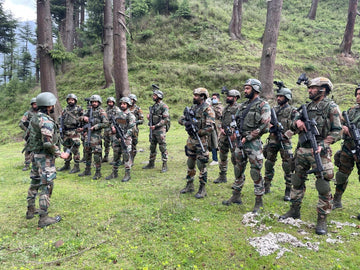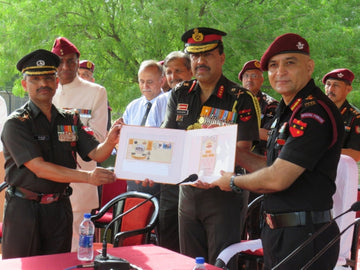For defense aspirants preparing for the Services Selection Board (SSB) interview, the significance of maintaining a structured and disciplined daily routine cannot be overstated. The SSB is a comprehensive evaluation designed to assess candidates' physical stamina, psychological traits, and interpersonal skills crucial for service in the armed forces. With thousands of candidates vying for a limited number of positions, those aspiring to join India’s defense forces must rely not just on their inherent abilities but also on a rigorous preparation strategy that can help them stand out.
The journey to cracking the SSB interview is both challenging and rewarding, and a well-defined daily routine can be the cornerstone of success. This article delves deep into the critical components of a daily routine tailored specifically for defense aspirants, offering insights and strategies to optimize preparation.
Historical Context
The SSB interview processes have evolved significantly since their inception in the 1940s. Originally designed to select capable leaders for the armed forces, these evaluations have been refined over decades, resulting in a multi-faceted approach that gauges psychological stability, physical readiness, and group dynamics. The rigorous nature of the SSB requires candidates not only to perform academically but also to exhibit qualities such as teamwork, leadership, and decision-making under pressure. Developing a structured daily routine has become increasingly vital in preparing effectively for these assessments, aligning closely with the evolving criteria that assess a candidate’s suitability for military service.
Early Morning Routine (5:00 AM - 8:00 AM)
Wake Up and Hydrate
Starting the day at 5:00 AM can seem daunting, but establishing this routine revitalizes and sets a proactive tone for the day. Upon waking, hydrate by drinking a glass of water, which jumpstarts your metabolism and clears your mind for focused activity.
Physical Exercise and Fitness Training
An essential part of preparation involves maintaining physical fitness. A rigorous 45-minute workout session can consist of various activities tailored to enhance endurance and strength—running, cycling, strength training exercises like push-ups, pull-ups, squats, and planks. Regular physical activity not only boosts physical stamina but also helps to build mental resilience, both of which are crucial during the SSB's physical evaluations.
Cool Down and Stretching
Post-workout, a 15-minute cool-down session focusing on stretching or yoga improves flexibility and provides mental clarity. Incorporating these activities into your routine ensures that you lessen the risk of injury and aid in the recovery process after intense workouts.
Freshen Up and Nutritious Breakfast
After your exercise, a refreshing shower can revitalize your body. Following this, consume a nutritious breakfast rich in proteins, carbohydrates, and healthy fats. A well-balanced meal fuels your day and improves concentration and cognitive function, essential for effective study sessions.
Daytime Routine
Studies
Allocate a significant portion of your day strictly for studying. Preparing for the written exams, such as the Combined Defence Services (CDS) exam, should be a top priority. Focus on revising subjects, practicing mock tests, and targeting weak areas. Set specific goals for each study session to enhance effectiveness. Consistency in study habits leads to cumulative knowledge retention, which is crucial in high-pressure test environments.
Personal Development and Hobbies
While rigorous study is essential, personal development should not be neglected. Dedicate time to your hobbies and activities that foster skills outside of academic preparation—such as reading, creative writing, or even learning a musical instrument. Engaging in these pursuits helps develop a well-rounded personality, a quality that is crucial in SSB interviews.
Social Interaction
Maintaining social interactions with family and friends plays an essential role in mental well-being. Allocate regular intervals during the day for socializing. This interaction not only helps relieve stress but also aids in developing communication and interpersonal skills, which are integral to the SSB process.
Evening Routine (4:00 PM - 8:00 PM)
SSB Interview Preparation
The evening hours are critical for focused SSB preparation. Engage in practicing psychological tests such as the Thematic Apperception Test (TAT), Word Association Test (WAT), Situation Reaction Test (SRT), and Self Description Test (SDT). These tests are designed to assess your psychological attributes and understanding of situational dynamics, making focused practice invaluable.
Group Discussions and Mock Interviews
Enhance your communication and leadership skills by actively participating in group discussions or mock interviews with peers or mentors. Engaging in these exercises simulates real SSB interview scenarios, allowing you to practice articulating your thoughts and opinions clearly and confidently.
Group Testing Officer (GTO) Tasks Preparation
Participating in activities that mirror Group Testing Officer (GTO) tasks can be highly beneficial. Join sessions that simulate team problem-solving exercises, group planning tasks, and other leadership activities. Watching videos or reading about successful strategies for GTO tasks can provide insights into effective team dynamics and leadership skills.
Additional Tips
-
Consistency: The backbone of effective preparation is consistency. Sticking to your routine with dedication significantly enhances the balancing of multiple preparations.
-
Health and Hydration: Continuous focus on a healthy diet is crucial, as it fuels your body and enhances cognitive performance. Adequate hydration and nutrition are vital for sustaining energy levels throughout your demanding routine.
-
Positive Attitude and Motivation: Maintaining a positive attitude plays a fundamental role in preparation dynamics. Surrounding yourself with supportive individuals can provide the motivation necessary to overcome challenges and maintain focus.
-
Time Management: Prioritize your daily tasks and manage your time effectively. Utilize techniques such as timers or techniques like the Pomodoro technique to create clear study sessions that allow for focused work followed by well-timed breaks.
-
Regular Breaks: Introduce short breaks in between study sessions to maintain focus and prevent mental fatigue. Employ techniques such as a 5-10 minute break every hour to recharge mentally.
General Principles
An effective daily routine should incorporate structured time blocks for specific activities, such as studying, physical activity, relaxation, and personal development. Customizing your schedule according to personal preferences and availability can also enhance adherence.
Additionally, due to the distractions of modern life, especially social media, it’s vital to limit its usage and avoid negative addictions like excessive gaming or binge-watching OTT platforms. This disciplined approach indirectly contributes to a more focused and less distracted preparation process.
Challenges and Solutions
Preparing for the SSB is fraught with challenges that can deter aspirants. Balancing academics, physical fitness, and personal life can overwhelm candidates if not managed properly. Sticking to a structured routine presents a powerful solution:
-
Time Constraints: Many aspirants find it challenging to manage all preparation aspects within a limited timeframe. Creating a clear timetable that allots time to study, physical exercise, and relaxation can ease scheduling issues.
-
Mental Stress: The pressure to perform can lead to anxiety. Regular breaks, combined with mindfulness techniques such as meditation or yoga, can help manage stress and maintain mental clarity.
-
Lack of Motivation: Some candidates may struggle to stay motivated throughout their preparation journey. Peer groups or study partners can greatly enhance accountability, providing both encouragement and a sense of camaraderie in a competitive atmosphere.
Future Trends and Predictions
The landscape of SSB interviews and defense aspirant preparation is expected to evolve further. With increasing emphasis on psychological evaluations and technological advancements, future preparation routines may incorporate digital platforms for collaborative study, virtual reality simulations for GTO tasks, and app-based fitness monitoring. Staying updated with these changes and adapting accordingly will set aspirants one step ahead in their preparation journey.
Conclusion
In conclusion, adhering to a well-structured daily routine is crucial for defense aspirants preparing for the SSB interview. This organized approach not only enhances academic performance but also improves physical and psychological readiness. By integrating time for study, exercise, personal development, and social interaction, candidates can effectively manage their preparation while cultivating a resilient and balanced lifestyle.
As they embark on this rigorous journey, aspirants must remain dedicated, fostering a positive mindset and resilient spirit. The path to joining the armed forces is challenging, but with discipline, determination, and a structured daily routine, success lies within reach. Let this routine serve as a roadmap to not only secure a place in the ranks of India’s defense forces but also to emerge as a well-rounded individual prepared for life's challenges. For those looking for expert guidance and resources, utilizing platforms like SSBCrack and SSBCrackExams can provide ample support in their preparation endeavors.





